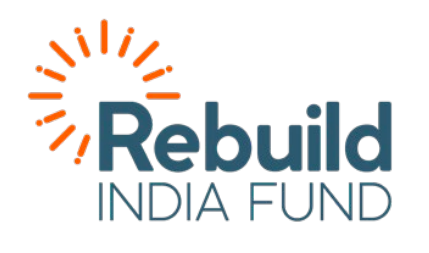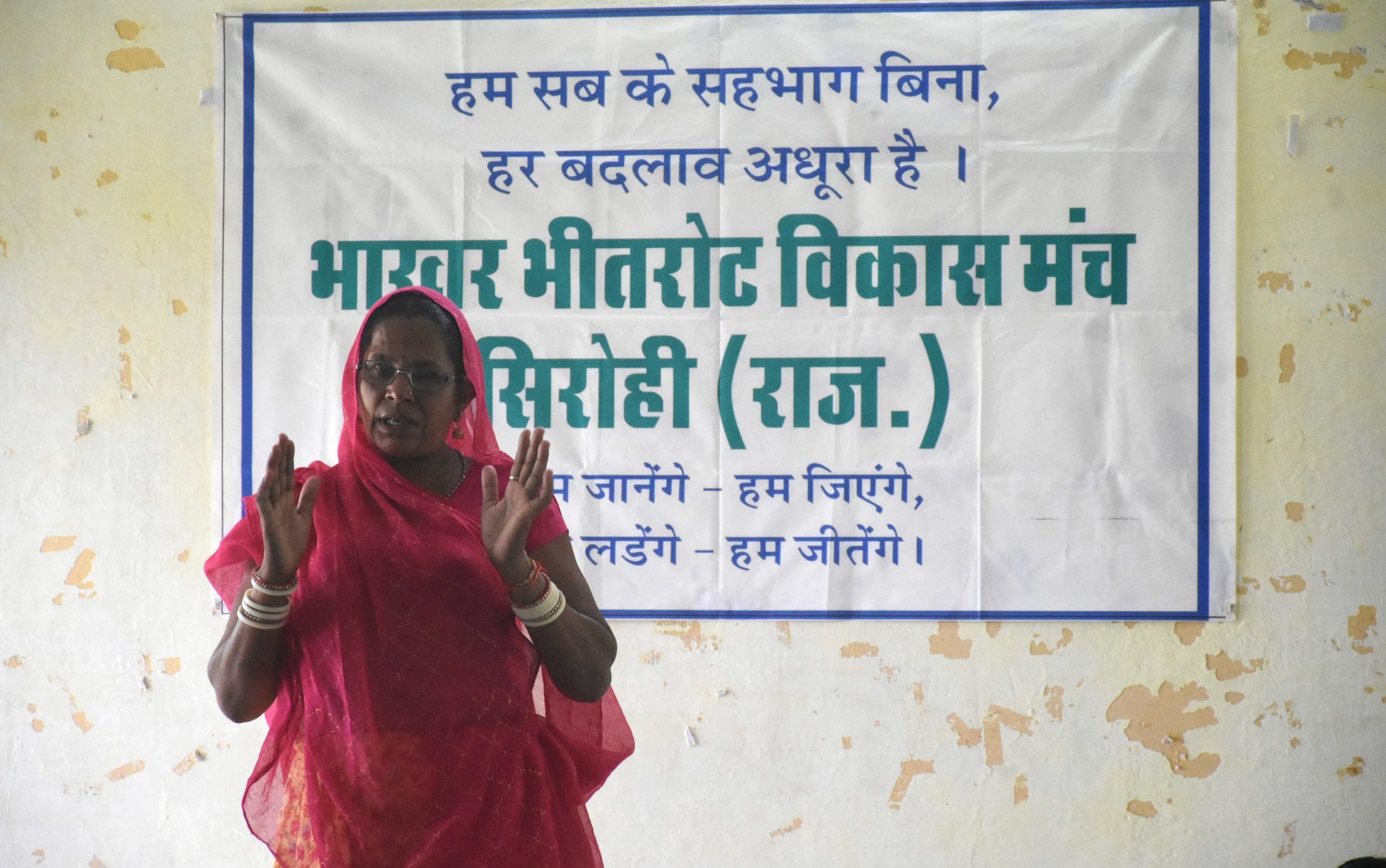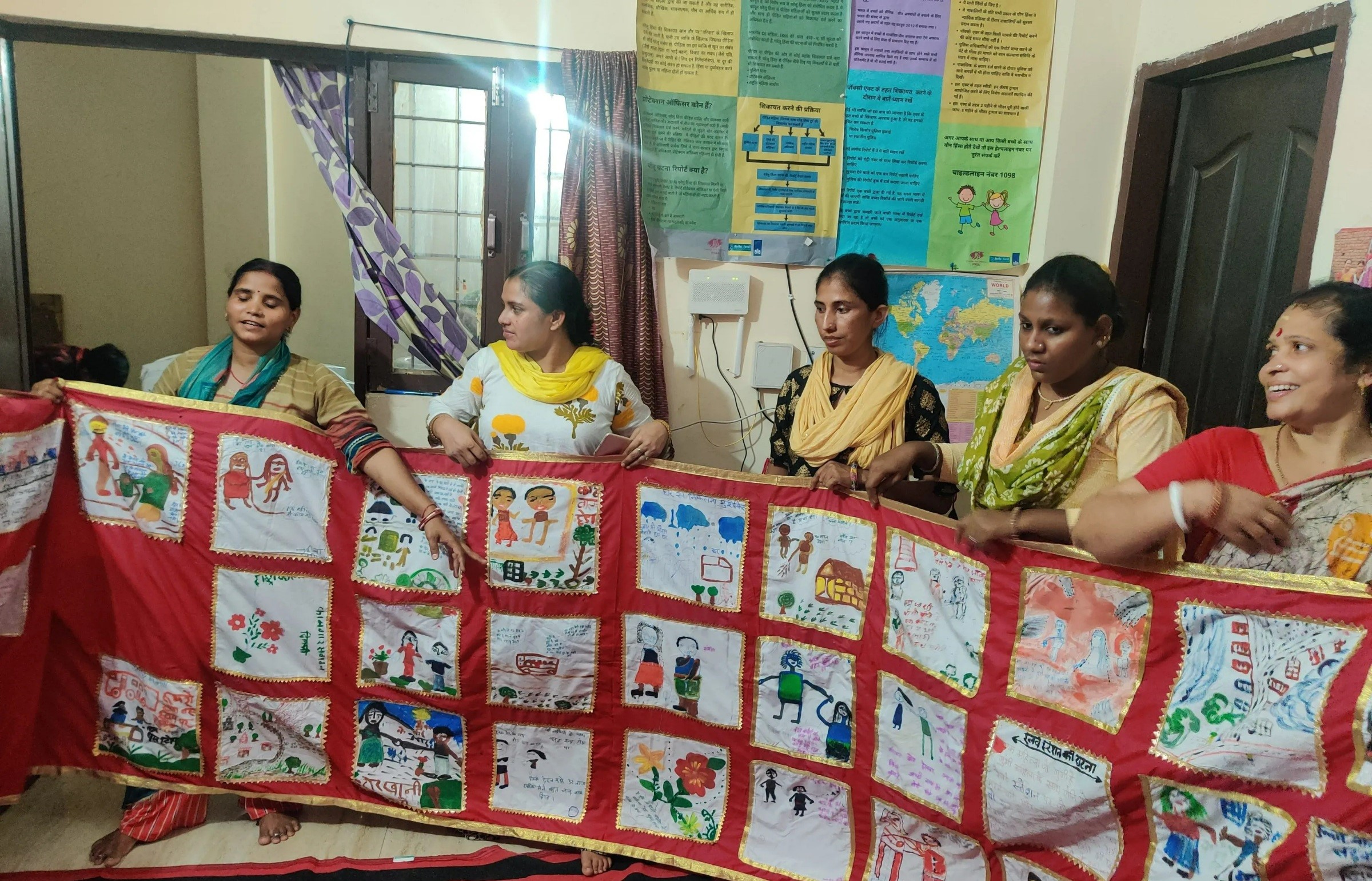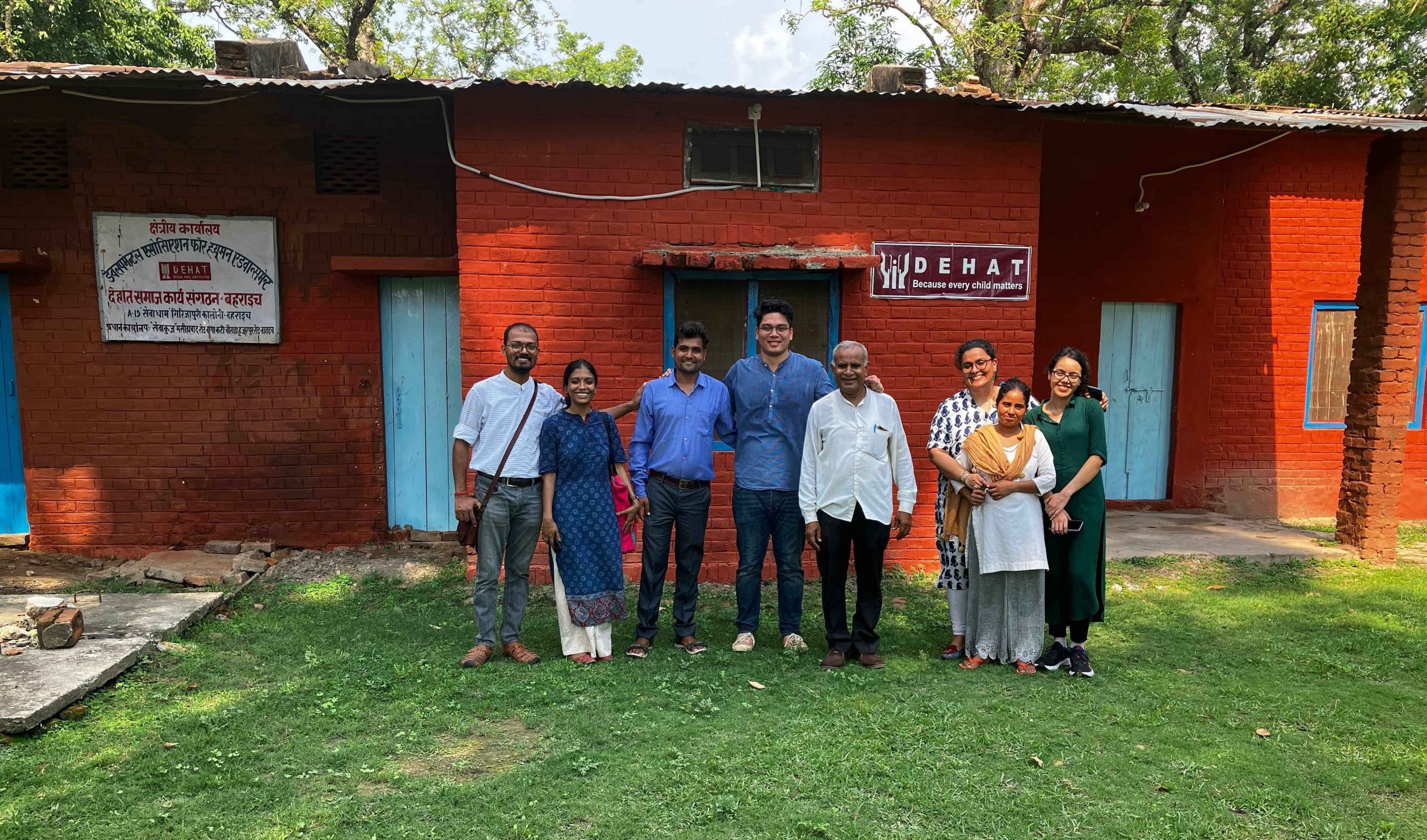The Forest Rights Act, enacted in December 2006, became a significant legislation in India that grants legal recognition to the rights of traditional forest-dwelling communities over land and other resources. It aims
to correct historical injustices and empower such communities by ensuring they have rights to forest lands and resources. Over the years, many institutions, government bodies, and non-profit organizations have worked to enable communities to access these rights. Anantvijay and Khyati from the Rebuild team visited one such organization, Jan Chetna Sansthan (JCS).
A Learning Organization
Our day started with a scenic drive from Udaipur to Abu Road. Upon reaching, we first met the JCS team at their office, nestled in a small housing complex below the hill station of Mt. Abu. We realized that the office space had been recently renovated, and the team’s joy and excitement were palpable amidst introductions, tea and snacks.
Introductions segued into conversations, with leaders Richa ji and Ashok ji sharing the organisation’s journey. The team (many of whom have been around for 15+ years) chimed in with their experiences, learnings and reflections. JCS works with tribal communities in South Rajasthan across several districts, including Sirohi, Udaipur, Dungarpur, Banswara, Pratapgarh, and Pali. Through the years, the team has worked with the communities to support them across livelihoods, health, education, women’s empowerment, and agricultural and forest rights.
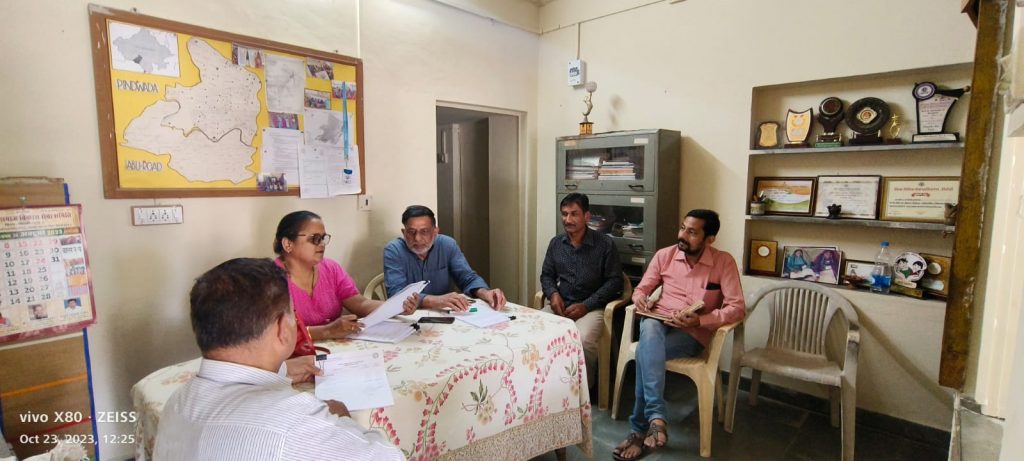
Their journey began in the early 90s, with Richa ji and her team immersing themselves in the region, often walking from village to village. Before diving into interventions, they needed to establish trust with the communities via group discussions. An early realization was that engaging with community members during the day was a struggle since they had work and household commitments. Consequently, their gatherings evolved into night meetings, eventually forming various ‘Sangathans’ (groups) that aimed at empowering communities to assert their agency and access their entitlements.
JCS started weaving multiple interventions into their programming over the decades by building on the trust created with the night meetings and responding to the community’s needs. These spanned—developing a Gram Kosh (village fund) that provided financial resources for self-governance, advocating for community forest rights through social welfare activities focusing on agriculture, horticulture and animal husbandry, forming cooperatives for socio-economic development such as Tribal Tendu Leaf Collectors Co-operative Society, building agency among tribal communities by enabling better implementation of government schemes such as MNGREGA, Forest Rights Act and conducting social audits1 for schemes at the gram panchayat level.
There were several wins and losses, but the learning curve was constant. More recently, the team has had multiple reflections with support from funders and other partners. They realized that while they spent a long time with the different interventions, they needed to revisit their core strengths. Thus, the organization has started to gear itself towards re-engaging the communities, planning night meetings and rebuilding Sangathans. With a night meeting scheduled for the day, we travelled with the JCS team to Nichlagarh.
A Night Meeting
About 20 km from the JCS office lies the village of Nichlagarh, where a night meeting had been planned. The venue for this meeting was Sharmi Bai’s house, settled amidst the Aravalli hills.
Often referred to as a ‘Daksha’ (community mobilizer), Sharmi Bai today leads and facilitates group meetings and mobilizes youth and women. Night meetings are often conducted in settings that are not only accessible to the community but also offer a safe space to learn and voice their concerns.
Following introductions and greetings, we learned that the participants of this meeting were from a newly formed youth group. With a twofold focus on nurturing responsibility and building community pride, Richa Ji set the context by openly sharing the organization’s challenges. Focusing on the challenges of rights-based work without the community’s support, she reinstated, ‘while the constitution gives us individualistic rights, initiatives such as PESA2 build communities.’
This group was still in the early stages of formation, with members initially reserved about sharing thoughts and then slowly opening up about their concerns. A fundamental problem was around ensuring MGNREGA was working well. Specifically, the group was very keen to discuss how to create pathways for adequate and regular pay, using Shramik3 cards, etc.
It was educational to observe the team’s ability to motivate the youth to contribute, constantly reiterating how village meetings serve as a platform for sharing knowledge, building agency, and improving access to entitlements. This conversation also demonstrated how each of the members of the team had a voice. It was free to disagree openly, eventually reaching a consensus with the youth on the next steps. These included taking action on the Shramik card front, innovating within the ambit of MGNREGA4 and initiating a female youth group. We spent the night at the same house, reflecting on the efforts of leaders like Sharmi Bai, who relentlessly work to build trust, which drives these initiatives.
On Mental Health and Wellbeing
We also conducted a focus group discussion for team members of JCS and their leaders in a bid to build our understanding of mental health and well-being in the development sector. Team members participating in the focus group discussion came from diverse backgrounds and experiences, with some having worked in the social sector for decades. Their journeys highlighted their commitment and deep connection with the organization and the communities they work with. Their narratives capture trust and a supportive work environment’s role in cultivating relationships over time. The group recognized the need for a space for discussions on mental health. They spoke about how this space will be essential for their individual and collective growth and closely tied to their relationships, the support they receive from their community, and the environment in which they work.
Richa Ji’s thoughts echoed those of her team as she talked about the importance of championing the role of trust. For her, trust between her and the team members acts as a mutual motivator, spurring them
to contribute towards collective well-being.
Furthermore, she also shared that personal wellbeing and dynamics within the team are closely interconnected. That trust, positivity and effective
coping strategies play a pivotal role in building the organization’s culture.
On Resilience
Richa ji shared that resilience to her is ‘aap apne aap ko koi paristithi ke hisaab se kaise uska badlav karne ke liye dhaal sakte ho’ (translating to how one changes oneself, accommodates and moulds themselves to adapt to the changing situations). There is pride in how the team’s resilience has been built over time, with agility and responsiveness to the evolving needs of the communities and their successes and setbacks. Being a part of the Rebuild India Fund has enabled them to build this resilience further.
This year, the organization was not only able to utilize the funds for strengthening community-based groups working with government officials and a long overdue renovation of their office, but also enabled them to build their team’s capacity with team members now getting to opportunity to travel with Richa ji for various meetings in other states.
In continuation in their journey with Rebuild, Richaji shared that her roadmap includes succession planning along with developing and implementing a communications strategy to amplify their outreach. Through Rebuild’s capacity-building initiatives, they would extend their support for social audits to their peers. Moreover, acknowledging their learning journey, she plans to document this process to ensure that the insights and experiences gained become valuable resources for both the organization and the broader community of non-profits.
Keeping these needs in mind, we discussed our engagement plans with Richaji. Over the next few months, we will support the organization through connecting Richaji with leaders in the portfolio that have built succession plans, add them as a service provider to our capacity building database and explore opportunities of co-writing articles to document their learnings.
References:
- Social audit: Social Audit is the critical stock taking of any programme or scheme by the community with active involvement of the primary stakeholders. It includes audit of the quality of works being executed at different levels along with the details of disbursements made, the number
of labourers employed and materials used. ↩︎ - PESA: Panchayats Extension to Scheduled Areas Act, introduced in 1996. The main objectives of the PESA Act are to prevent the Gram Sabha’s higher-level panchayats from assuming control over their lower-level counterparts’ roles and responsibilities, to give self-rule to the majority of the tribe’s members, etc. ↩︎
- Shramik cards ensure workers’ rights with benefits such as pension, death and accident insurance and financial aid for families in cases of incapacity. Application is done on the online e-shram portal. ↩︎
- MGNREGA: Mahatma Gandhi National Rural Employment Guarantee Act 2005 or MGNREGA is an Indian social welfare measure that aims to guarantee the ‘right to work’. It aims to enhance livelihood security in rural areas by providing at least 100 days of wage employment in a financial year to at least one member of every household whose adult members volunteer to do unskilled manual work. Read more about the act here: https://static.pib.gov.in/WriteReadData/specificdocs/documents/2021/nov/doc2021112931.pdf ↩︎
